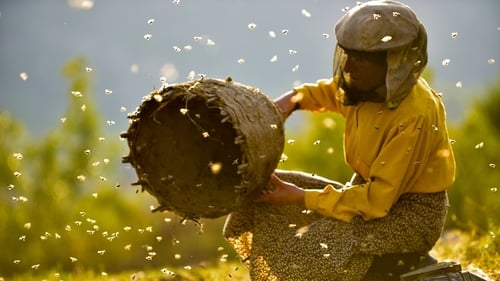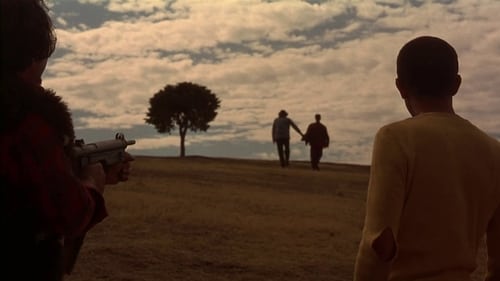The Romanian Minister Istrate Visits Resen (1911)
Género : Documental
Tiempo de ejecución : 4M
Director : Janaki Manaki, Milton Manaki
Sinopsis
Early Balkan footage.

Documental sobre la última mujer recolectora de abejas de Europa. Hatidze es una mujer cerca de la cincuentena de un pequeño pueblo en Macedonia que cría colonias de abejas en unos cestos hechos a mano que deja escondidos entre las rocas. Sin protección ni ayuda, es capaz de amansarlas para poder extraer la miel y venderla en la capital. Todo es idílico hasta que, de repente, nuevos vecinos se instalan cerca de las colmenas, estorbando su paz y la de sus abejas. Así como las abejas obreras pasan toda su vida cuidando de la abeja reina, Hatidze ha comprometido su propia vida al cuidado de su madre, con la que vive en una cabaña. La intrusión de los recién llegados, una familia con siete niños ruidosos acompañados de 150 vacas, provocará un conflicto que podría destruir la forma de vida de Hatidze para siempre.

Tres trágicas historias de amor que se entrelazan para ilustrar los efectos devastadores de la guerra y de aquellos que, sin quererlo, se han visto obligados a participar en ella. Dos de los relatos están ambientados en Macedonia, que se encuentra al borde de la guerra civil, y el otro se sitúa en Londres.

As Macedonia faces its difficult transition, a boy escapes into a world of his own creation.

Godina was ordered to make a short film glorifying the army, but instead made a film about making love, not war. The censors hacked it up, but he managed to save one complete copy.

High in the mountains of Macedonia a team of young film makers are making a documentary about Katerina Vandeva - a descendant of an ancient and very famous family. Several former state and party functionaries interfere in the filmmaking in the hopes of manipulating Katerina's confessions for their own purposes. Nikola, the director, and his friends have to make the choice - whether to compromise with their consciences and their art, (as normally happens here in the Balkans), or whether to preserve Katerina's message.

A group of Macedonian women are shown hard at work.

The story takes place in March of 1943 during transportations of Jews from Skopje. Nikola is a surgeon who was taken his working license away, and spends evening hours at the local bar where German officers, along with Bulgarian officer Simeonov, play Russian roulette with their gun pointed at prisoner's head. After suicide of one German mayor, Nikola and the prisoner escape.

The inhabitants of a small village in a backward area of Macedonia earn their living by sending their men abroad in search of employment. Three young girls, named Elica, Maria and Nikolina live and work as schoolteachers in the village. Each of them try to make sense of their lives, in that situation where it is imposed on them. In the village the greatest problem is the supply of water. Spring water is carried by Marko from the distant mountains Marko is falls in love with the poor girl Kate...

Early Balkan footage.

Early Balkan footage.

The first Macedonian Movie from 1952- Frosina is one of the many Macedonian wives whose husbands are economic emigrants abroad. Marriage does not bring them a family, only the burden of life itself. After her husband's short visits, she gives birth to children who do not live long because of the poverty into which they have been born. She gives birth to them alone, and she buries them alone. Only her last child, Klime, survives all his various illnesses and grows up to be her one joy in life. The war breaks out...

Early Balkan footage.

100 years since the beginning of First World War. Locality - French cemetery in Bitola. State protocol. There are deputies, ministers, ambassadors, military attaches, consuls, honorary consuls, media present - Priests - Orthodox, Catholic, Muslim. - Military band. Jean Batiste Valerie, an old man of about 77 years of age, arrives in Bitola for the first time. Tiny, petite, with thin and gray hair, arrives late at the sad ceremony held in honor of the fallen French soldiers in the First World War. According to correspondence and information from the French army, his predecessor with the same name and surname must be located somewhere nearby. The ceremony had already begun.

A group of crotchety codgers attempt to revive the punk-rock band they all played in 17 years earlier in "Punk Is Not Dead".

"Skoplje '63" is a 1964 Yugoslavian documentary film directed by Veljko Bulajić about the 1963 Skopje earthquake (Skoplje, per film title, is the Serbo-Croatian spelling of Skopje). The filming started three days after the earthquake and lasted for four months. After that, Bulajić spent 12 months editing the footage at Jadran Film studios.

Early Balkan footage.

After losing his job on the first day of school, an idealistic teacher attempts to get rehired by locking his students in the classroom and forcing them to resolve a long-standing feud between their villages.

A group of Macedonian partisans are hiding away in the mountains from Bulgarian fascist authorities that occupy Macedonia.

Newsreel of the visit of sultan Mehmed V Resad to Bitola.

Early Balkan footage.











